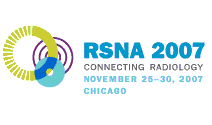
Abstract Archives of the RSNA, 2007
Han Feng Yang MD, PhD, Abstract Co-Author: Nothing to Disclose
Xiangping Zhou, Abstract Co-Author: Nothing to Disclose
Yong Du MD, PhD, Presenter: Nothing to Disclose
Xiao Ming Zhang MD, PhD, Abstract Co-Author: Nothing to Disclose
To investigate the value of perfusion CT imaging for assessment of angiogenesis of liver cancer.
21 patients with histological proven liver cancer (including 19 patients with hepatic cell carcinoma and 2 patients with cholangiocellular carcinoma) had undergone CT perfusion examination. Take non-tumors area as a self-control group, tumor total blood flow and the relative distribution of tumor arterial blood flow, tumor portal blood flow to tumor total blood flow were analyzed. The slices of post-operation specimen were evaluated with emphases on the CD34-positive neovasculatures in parenchyma of tumor. According to the Weidner’method, tumor microvessel density was counted. Finally, the correlation between the tumor microvessel density and the tumor blood parameters including tumor total blood flow, tumor hepatic arterial flow, tumor portal flow, tumor hepatic arterial perfusion index, tumor portal perfusion index were analysed with linear regression.
Tumor total blood flow, tumor portal blood flow were lesser than that of non-tumor area, 0.5944±0.2142 ml•min-1•ml–1 vs 0.9765±0.2871 ml•min-1 •ml–1,0.2371±0.1307 ml•min-1•ml–1 vs 0.8780±0.2831 ml•min-1•ml–1,respectively,P<0.05.tumor hepatic arterial blood flow, tumor hepatic arterial perfusion index were higher than that of non-tumor areas, 0.3574±0.1578 ml •min-1•ml–1 vs 0.0984±0.0756 ml•min- 1 •ml–1,0.6002±0.1921 vs 0.1094±0.0873, respectively, P<0.05.There were significant correlation between tumor total blood flow, tumor hepatic arterial flow and MVD of tumor, the coefficient correlation were 0.849, 0.829,respectively, P<0.05.
Perfusion CT imaging can assess quantitatively the blood supply and its distribution in hepatic primary malignant tumor. Tumor total blood flow and tumor hepatic arterial blood flow can be accepted as a ponderable parameter of assessment of angiogenesis of primary liver cancer.
Perfusion CT imaging can be used to evaluated quantitatively the blood supply of hepatic primary malignant tumor.
Yang, H,
Zhou, X,
Du, Y,
Zhang, X,
A Study of the Correlation of the Perfusion CT Imaging with the Angiogenesis of Liver Cancer. Radiological Society of North America 2007 Scientific Assembly and Annual Meeting, November 25 - November 30, 2007 ,Chicago IL.
http://archive.rsna.org/2007/5009289.html

